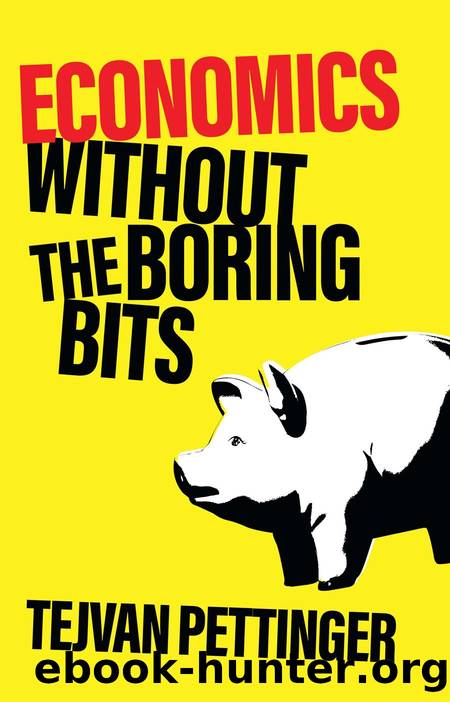Economics without the Boring Bits by Tejvan Pettinger

Author:Tejvan Pettinger [Pettinger, Tejvan]
Language: eng
Format: epub
Publisher: Welbeck Publishing Group Limited
Published: 0101-01-01T00:00:00+00:00
ADAM SMITH
For good reason Adam Smith is considered the father of economics. In The Wealth of Nations (1776), written at the dawn of the Industrial Revolution, he laid a framework for classical economics, which has endured to this day. The Wealth of Nations helped to introduce and explain many key concepts in economics, such as the division of labour, free markets, productivity, wage differentials, the invisible hand and free trade. Many of these concepts we now take for granted but, at the time, they represented a revolution in economic thinking. They helped to shift economies away from mercantilism and ushered in a new free-market, laissez-faire approach.
Perhaps the most fundamental contribution Adam Smith made was that relating to free markets. In The Wealth of Nations, he explained how individuals pursuing their own self-interest could, through the workings of the free market, create a beneficial outcome for everyone in society. He used the now famous example of a butcher, brewer and baker motivated by self-interest: âIt is not from the benevolence of the butcher, the brewer, or the baker, that we can expect our dinner, but from their regard to their own interest.â5
Smith also referred to the invisible hand. He did so on only three occasions but has become synonymous with it. The invisible hand, said Smith, is the way that individuals seeking their own personal welfare have an unexpected benefit to the rest of society â âled by an invisible hand to promote an end which was no part of his intention.â6 The importance of this concept is that it has become the philosophic basis for laissez-faire economics and minimal state intervention. Economists and politicians who are inclined to support limited government intervention and free markets, refer to Adam Smith in support of policies from the trickle-down effect to laissez-faire capitalism.
However, while Smith definitely expanded on the benefits of free markets and was sceptical of government intervention, his economic thought was not simplistic. He first rose to prominence through a work on moral philosophy, The Theory of Moral Sentiments (1759). In it, Smith concentrates on how individuals are motivated not just by self-interest but also by a wider sympathy for his fellow men. To Smith, this sympathy and concern for others was as important as the motivation of self-interest. Some commentators have seen a conflict between Smithâs view of sympathy and the importance of self-interest. But, even in The Wealth of Nations, we see a much more nuanced view of self-interest depending on circumstances.
Also, although Smith was sceptical of government intervention in the economy, he could also see many cases where it was necessary. This included the regulation of monopoly power. Smith was well aware of how firms could gain monopoly power and then use this to exploit customers with higher prices. In effect, Smith was saying that the invisible hand may not always be there to create benefits for society, and was advocating not so much free markets as free competition. Strong competitive pressures are important for regulating self-interest.
With characteristic
Download
This site does not store any files on its server. We only index and link to content provided by other sites. Please contact the content providers to delete copyright contents if any and email us, we'll remove relevant links or contents immediately.
International Integration of the Brazilian Economy by Elias C. Grivoyannis(106928)
The Radium Girls by Kate Moore(12001)
Turbulence by E. J. Noyes(8001)
Nudge - Improving Decisions about Health, Wealth, and Happiness by Thaler Sunstein(7678)
The Black Swan by Nassim Nicholas Taleb(7086)
Rich Dad Poor Dad by Robert T. Kiyosaki(6574)
Pioneering Portfolio Management by David F. Swensen(6269)
Man-made Catastrophes and Risk Information Concealment by Dmitry Chernov & Didier Sornette(5980)
Zero to One by Peter Thiel(5763)
Secrecy World by Jake Bernstein(4727)
Millionaire: The Philanderer, Gambler, and Duelist Who Invented Modern Finance by Janet Gleeson(4446)
The Age of Surveillance Capitalism by Shoshana Zuboff(4267)
Skin in the Game by Nassim Nicholas Taleb(4223)
The Money Culture by Michael Lewis(4173)
Bullshit Jobs by David Graeber(4161)
Skin in the Game: Hidden Asymmetries in Daily Life by Nassim Nicholas Taleb(3973)
The Dhandho Investor by Mohnish Pabrai(3741)
The Wisdom of Finance by Mihir Desai(3718)
Blockchain Basics by Daniel Drescher(3564)
